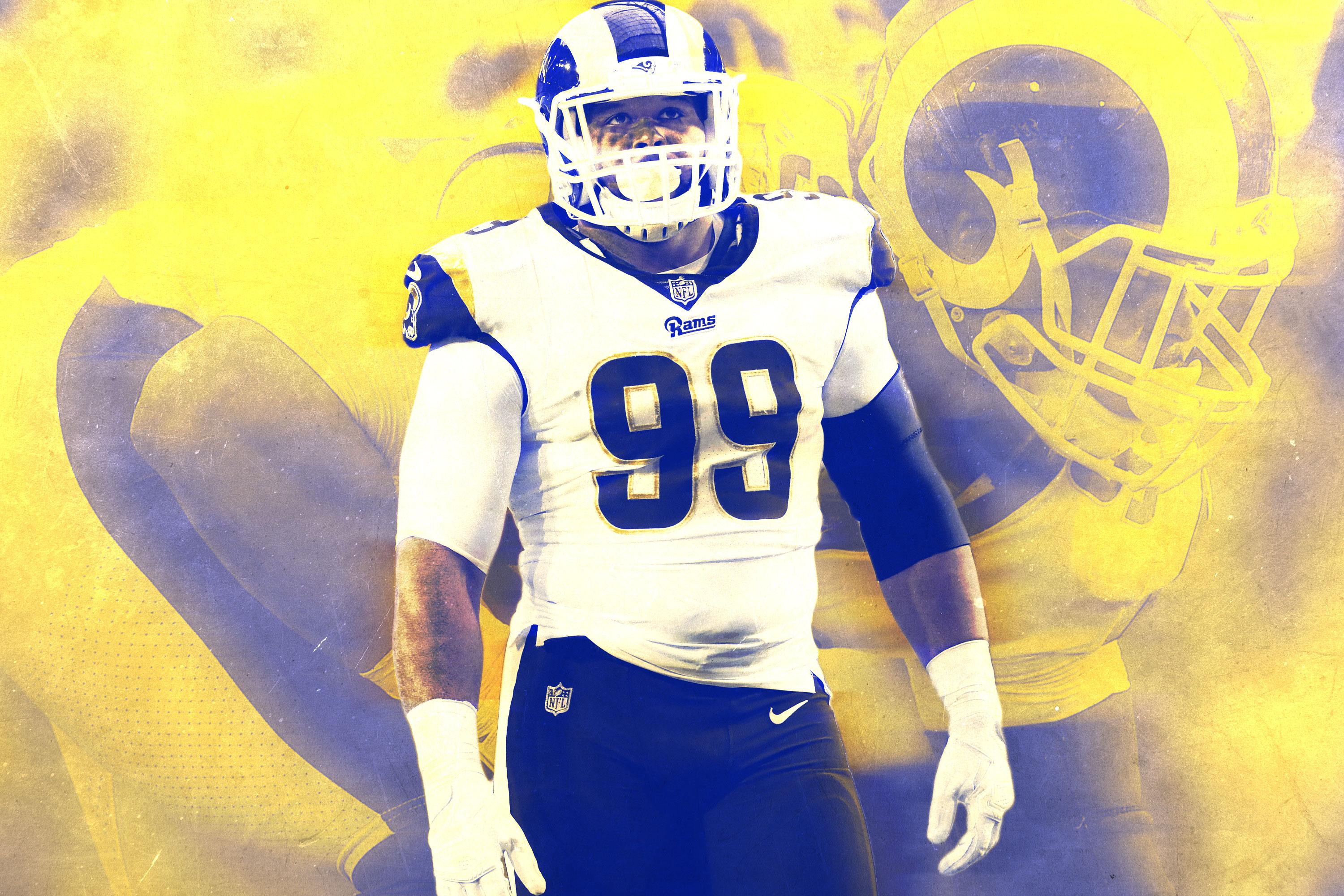
The term “destroyer of worlds” gets thrown around hyperbolically in reference to quite a few of the league’s most dominant players, but if there’s any defender worthy of the title, it’s Rams defensive tackle Aaron Donald. In fact, there are times, like during L.A.’s 42-7 blowout win over the Seahawks on Sunday, when that moniker feels like an understatement. Just ask ESPN’s Rams beat reporter, Alden Gonzalez, who tweeted this out during the game.
Donald has long haunted Seahawks quarterback Russell Wilson’s dreams—Wilson called him “the greatest defensive player [he’s] ever played against” before the game, in fact. On Sunday, Donald not only consistently blew up Seattle’s foundational wide zone run game, he constantly broke through Seattle’s pass protection to kill pass plays before they could even develop. In the first half alone, Donald registered pressure in the form of a hit, hurry, or sack on over one-quarter of his pass-rush snaps, an absurd rate for an interior defender. Officially, he finished the game with three sacks, four quarterback hits, two tackles for a loss, and a forced fumble. Unofficially, he completely ruined Seattle’s offense. It was about as dominant of a performance as the 26-year-old star has ever put together, and that’s saying a lot considering he’s been one of the NFL’s best defenders since he entered the league four seasons ago.
Think about it this way: Donald finished with eight sacks in 2016 and Cincy’s Geno Atkins led all interior defenders with nine—an average of just over one-half sack a game. Donald got three of L.A.’s seven sacks on Sunday alone, and probably should’ve been credited with a couple of more as he flushed Wilson out of the pocket and into the waiting arms of his Rams teammates. Donald had a major effect on just about every one of the Seahawks’ first eight drives, and effectively killed a few of them himself. To capture just how dominant he was, let’s just go drive by drive:
- Seahawks’ first possession: Receiver Tanner McEvoy fumbled on Seattle’s third play from scrimmage. Donald didn’t have much of an impact here, but with only three plays, he didn’t get too much of a chance.
- Seahawks’ second possession: Mike Davis lost 2 yards on first down, and Wilson missed Doug Baldwin deep, setting up a third-and-12 from Seattle’s 23-yard line. Donald ran right through a double-team for the sack.
Right guard Ethan Pocic was so concerned about Donald, and rightly so, that he didn’t bother to look for the Rams’ stunt, leaving Connor Barwin free to run up the middle—and that missed assignment didn’t even matter. Donald split the two defenders to reach through and bring Wilson down, pushing Seattle back to its own 15-yard line to punt.
- Seahawks’ third possession: Seattle was now down 6-0. On second-and-20, Donald flushed Wilson from the pocket, and Seattle’s quarterback ran straight into a sack, setting up a third-and-24. That’s a drive-killing play. Two plays later, the Seahawks punted out of their own end zone.
- Seahawks’ fourth possession: Now down 13-0, Seattle mounted a feeble attempt at a drive before stalling at midfield. On third-and-8 from the 50-yard line, Wilson threw in front of Paul Richardson for what should’ve been a first-down catch over the middle. Donald won’t get much credit for this misthrow, but it looked like Wilson rushed his motion just a smidge when he saw an unblocked Donald bearing down on him full-steam.
- Seahawks’ fifth possession: After picking Jared Goff off, Seattle had its first bit of momentum all day. It didn’t last long. Seattle went three-and-out, which included another third-down overthrow from Wilson, aided by the fact Donald hit the Seahawks signal-caller right after he threw.
- Seahawks’ sixth possession: Wilson felt pressure on first down and dropped the football as he was trying to escape. If only Wilson hadn’t voluntarily dropped the ball, Donald might have been able to spoil this series, too.
- Seahawks’ seventh possession: The Seahawks were now down 27-0. On the third play of the drive, a first-and-10 from Seattle’s 46-yard line, Donald looped around after forcing Wilson to abandon the pocket, grabbed ahold of him, and threw him down; Wilson managed to “throw” the ball backward (it’s officially a fumble) for a loss of 23 yards.
It doesn’t matter what happens after that; that drive is dead.
- Seahawks’ eighth possession (not counting a one-play drive to end the first half): Now in the third quarter, the Seahawks were down 34-0. After scrambling 10 yards on the series’ first play, Wilson sat in the pocket to throw on first-and-10: Donald ran straight through Seattle left guard Luke Joeckel for the sack.
That play alone, which set up a second-and-16, probably would’ve been enough to kill Seattle’s drive. But for good measure, Donald got past Joeckel again on the next play, which flushed Wilson from his spot. Robert Quinn, who’d initially been pushed way out of the play by left tackle Duane Brown, caught up to Wilson and brought him down to set up a third-and-26. That drive is already dead at that point.
When Seattle’s offense got the ball back, it’d be 40-0, and there’s no point in talking about what happened after that.
With the 42-7 win, the Rams dealt Seattle its most embarrassing loss in the Pete Carroll era and its worst home loss since 1997—a 41-3 drubbing to the Jets in the now-demolished Kingdome (Bill Parcells was the coach of the Jets for that game, by the way, and quarterback Neil O'Donnell passed for five touchdowns). It was a complete win for a Rams squad that looks like a near-lock for the NFC West title, and L.A. got excellent performances out of running back Todd Gurley and its special teams unit, especially Pharoh Cooper.
But the game was defined by a superlative performance by the defense and its linchpin, Donald. Wilson and the Seahawks offense got a few garbage-time yards and scored a touchdown late, but there was a point midway through the third quarter in which Seattle had gained just 56 total yards of offense on 34 plays—an average of 1.6 yards per play. Donald was the key to that total defensive superiority and proved he can take over a game in a way that few defenders can. As an unblockable force from the inside, Donald gives the Rams a pretty damn good trump card come January: Even if Goff has an off day, Gurley can’t find traction, and the special teams group is quiet, they can turn to their All-Pro interior disruptor to single-handedly wreck their opponents’ offensive game plan.

